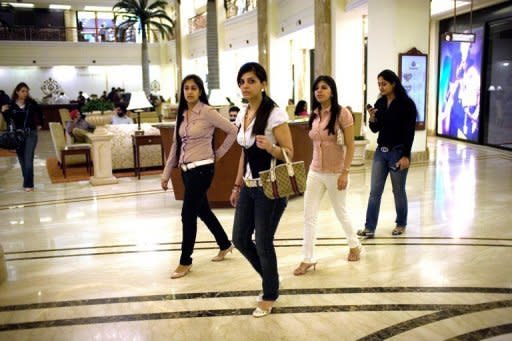India consumer spending at 7 year lows as slowdown bites
India's consumer spending is at its weakest in seven years, global ratings agency Fitch said on Tuesday, as it cut the outlook for India's vast retail sector from stable to negative. The announcement was a new blow to the Congress-led government, underscoring the challenges new Finance Minister P. Chidambaram faces in reviving an economy growing at its slowest pace in nearly a decade. Analysts had been betting on strong retail and financial services sector performances to help power Asia's third-largest economy as India's 1.2 billion people move towards more Western-style consumer spending patterns. But the slowing economy, due to high borrowing costs and a weak global outlook, have brought "a sustained deterioration in the discretionary spending ability", Fitch said, in an outlook covering the second half of 2012. India's once-booming economy grew by just 5.3 percent between January and March -- its slowest annual quarterly expansion in nine years. The Fitch assessment comes two months after it downgraded its overall credit outlook for India to negative from stable saying the nation's prized investment grade rating was at risk from flagging growth and spiralling deficits. Fitch on Tuesday warned spending was unlikely to pick up unless consumer price inflation, now running at over 10 percent, comes down significantly and consumers receive a "significant raise in real wages". Allowing supermarkets such as US giant Wal-Mart to enter India's retail sector could provide retailers easier access to foreign investment and have a "positive impact" on their finances, the agency said. India's government has allowed foreign brands such as Adidas to open 100-percent owned shops. But it has continued to block the entry of supermarkets amid parliamentary opposition and protests from small shopkeepers, who dominate the retail landscape and fear such a move will cause widespread loss of jobs. The retail sector is India's second-largest employer after agriculture. Foreign supermarket groups such as Wal-Mart currently operate as wholesalers in India but have been prevented from selling directly to the public. Analysts say the government, under Chidambaram, may move to fully open up the retail sector to foreign supermarkets -- allowing them to sell directly to consumers -- as it seeks to push ahead with long-stalled reforms. Trade Minister Anand Sharma said last month the government was committed to fully opening its retail sector to foreign investors but did not say when the decision might come. A study, meanwhile, by Indian industry body FICCI held out hope for the longer term, forecasting the retail sector will become a $1.3-trillion market by 2020, up from about $500 billion now. Turnover of so-called modern or chain stores will increase to $220 billion from $27 billion now, the report forecast.



